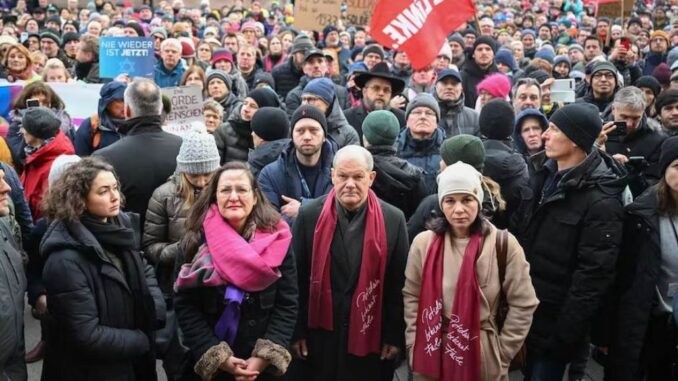
Chancellor Scholz and Foreign Minister Baerbock took to the streets against the right and at the same time protects the far-right Israeli government. Our critic of the federal government’s support for Israel before the International Court of Justice, in the midst of a context of protests.
By Carolina Menéndez Trucco
It is difficult to overcome the contradiction: Chancellor Olaf Scholz of the German Social Democratic Party and Foreign Minister Annalena Baerbock of the Greens spoke out against the turn of the right before thousands of people in Potsdam last Sunday the; while at the Court of The Hague, they protect the far-right Israeli government, which South Africa has accused of genocidal actions in Gaza. Given Germany’s fundamentally pro-Israel position, it is also surprising how arrogantly the federal government announces that the accusation against Tel Aviv, brought by high-ranking lawyers, “has no basis whatsoever.” And what happens if The Hague decides against Israel? Will the Scholz cabinet then place itself above the UN court?
While the streets were filling with people on Sunday the 14th in the capital of Brandenburg, the chancellor and the German Minister posed for the cameras. “Potsdam is colorful” and “We stand together” were displayed on numerous posters in the Old Market. Thousands of people protested on the outskirts of Berlin against the far-right, after it emerged that its activists were discussing the deportation of millions of immigrants and unwanted German citizens and meeting with AfD: Alternative for Germany politicians. “I stand here as one of thousands of Potsdam residents who stand up for democracy and against old and new fascism,” Baerbock told the German Press Agency. The Chancellor also lives in the state capital and, like the minister, has his electorate there, that is, they represent the Potsdam area in the German Parliament. Both wore burgundy scarves with the inscription Potsdam Shows Its Colours. According to the initiator of the demonstration, Mayor Mike Schubert, 10,000 people participated in Potsdam, but thousands of others also gathered in several cities and at the symbolic Brandenburg Gate over the weekend to demonstrate against the right.
Since it became known that the far right was considering mass deportation of people who do not fit its German image, there has been a huge spread of protests. “All together against fascism!” shouted some of the 10,000 protesters who marched through Leipzig on Monday afternoon holding their phones with the lamp on. More than 15,000 people also demonstrated this Monday in Essen. In Leipzig, in addition to protesting against the AfD, they have also protested against the ultra-conservative group Union of Values under the slogan “Enough!” and slogans such as “Fascism never again” have been chanted. There were also demonstrations in Rostock and Hamburg.
The powerhouse of extremism
There was an alleged trigger. Last week, the media Correctiv published the results of an investigation into a far-right meeting in Potsdam attended by figures from the Identitarian Movement, the AfD and two representatives of the Union of Values association, affiliated with the Christian democrat CDU. Identitarian Movement leader Martin Sellner confirmed to the German Press Agency that he had spoken of “remigration” there. When right-wing extremists use the term, they usually mean that large numbers of people of foreign origin should leave the country, even under duress. According to Correctiv‘s investigation, Sellner named three target groups: asylum seekers, foreigners with the right to remain in the country, and “unassimilated citizens.”
In reference to the event, the mayor of Potsdam, Mike Schubert, was able to remark that “these plans recall the darkest chapter in German history.” AfD has sought to distance itself from the meeting, pointing out that it had “no” organizational or financial ties to the event, that members who apparently attended did so in a purely personal capacity, and that it was not responsible for what was discussed there.
Debate over AfD ban
After the scandalous meeting, debate broke out again about a possible ban on the AfD. The party is clearly considered far-right in Saxony, Saxony-Anhalt and Thuringia by the respective Office for the Protection of the Constitution and also a suspect case nationwide. However, the ambivalences of Federal President Frank-Walter Steinmeier of the reformist SPD cannot be trusted. “I cannot judge the chances of success; a process would probably take a long time,” Steinmeier told the Süddeutsche Zeitung newspaper.
Banning the AfD and fighting the right is not only feasible, but also urgently necessary, given the dangers to fundamental freedoms and the rights of the working class. But the call for solidarity does not work if the chancellor ends up giving in to pressure from the right and deporting people on a large scale. On the other hand, one might wonder why Germany does not also take a consistent position at the international level, breaking diplomatic relations with the genocidal State of Israel, supporting the complaint presented by South Africa before the International Court of Justice, instead of rejecting it and wanting to intervene as indirect party in the trial. “That different countries evaluate Israel’s operation in the Gaza Strip differently,” as the German government wants to make understood through the statements of its spokesperson, Steffen Hebestreit, does not mean that it is the truth of what happened. The history of apartheid suffered by the Palestinian people dates back 75 years. And those who claim to confront the extreme right should be consistent and fight it everywhere, including in Israel. Not doing so is having double standards.








